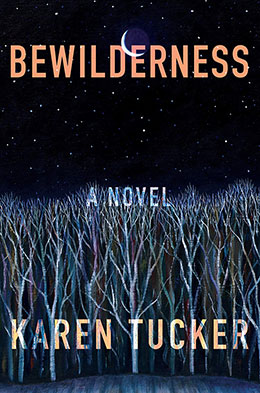A Review of Bewilderness by Karen Tucker
Bewilderness
by Karen Tucker
New York: Catapult, 2021.
274 pages
$26.00

Karen Tucker’s debut novel Bewilderness (Catapult), set primarily in rural North Carolina, tells the story of Irene and Luce, two waitressing drug-users sharing a bungalow and constantly scrounging for their next high.
Told retrospectively through Irene’s point-of-view, the novel opens the night of Luce’s going-away party. She and her boyfriend Wilky, a former army man and sometimes user/sometimes bartender, are leaving for Florida in search of sober, new lives. But this shining new life turns into a mirage when Wilky is found dead of an overdose just before their departure. Instead of reaching sobriety, Luce is set spinning again, and her best friend Irene is more than happy to accompany her through the pill-induced aftermath.
While some addiction narratives may be driven by two possibilities — either a character willfully decides to stop using, or a character dies from using — much of Bewilderness focuses on the hazy period before decisions are made, when all that matters is acquiring more pills, achieving another hit.
Irene becomes so entrenched in her habit that she sees drugs even when outside walking: “It wasn’t until we rounded the bend that a pale blue moon appeared above us like a giant 30 just waiting for someone to reach up and snatch it” (6). As the narrator looking back on this period, Irene has enough self-awareness to guide readers through her obsessive mindset: “One of the biggest battles you face when using is the constant shortage of goodies,” she narrates, “— and yet the moment you swear them off forever, pills start materializing all around you like some kind of sick joke” (6).
Through incredibly precise vocabulary, especially when describing pill brands, colors, uses, and effects, Irene takes us into this topsy-turvy world with authority. With Irene we navigate pill acquisition — in Wal-Mart parking lots and convenience store bathrooms, at parties in sketchy apartments and in would-be doctor’s offices. This navigation, while often convoluted and unpredictable, feels maze-like yet at times educational. As a reader I felt wholly compelled by the landscapes Tucker created in Bewilderness and the engines pushing her characters forward within them. In Irene, Tucker has created a character whose two strongest hungers — for more pills and for Luce’s attention — at times feel monstrous, propelling the narrative forward in their want.
Tucker so vividly details the pattern of scrounging and searching — the degrading acts one must do to score pills, the long hours spent on dirty couches with strangers — but Bewilderness also gives readers a parallel entry into the land of recovery. Irene and Luce sporadically attend the 1:30pm group meetings, with talk of sponsorship and one-year tags. The meeting at times is a hopeful beacon, but just as often, serves as another place to go (or avoid) within this small, not-wealthy town.
Throughout the novel, and especially in the drug-filled hazes, the language is heightened and lush. At the first blush of a new high, Irene narrates: “The fog burned away around us and the sky opened back up with all of its bright, dazzling promise. We were invincible once again” (116). Readers share in her breathlessness. And on page 137, Irene’s experience again is so personal and yet feels like it belongs on a much grander scale: “Soon the only thing left was the mysterious grace of god rippling all through me, along with a faint sour drip at the back of my throat.”
It’s too easy to say that Tucker skillfully carries readers through the highs and lows of addiction. She does do that, but also she manages to create earnest, funny characters who make the wrong choices and break readers’ hearts as well as their own over and over again.
Bewilderness has many beautifully dramatic and wrenching scenes — when Luce and Irene crash Wilky’s funeral reception at his family’s home, for instance — but I also was impressed by the novel’s structural playfulness in terms of form. Bewilderness includes a surprising chapter composed only of Reddit exchanges, a chapter that’s primarily a list of favorite memories, and perhaps most striking, a chapter of commands that’s essentially a how-to of becoming an addict (though I should note the very first line is “First things first: don’t do it” (141)). These narrative moves let readers see other sides of Irene, sometimes beyond the confines of her own voice.
Still the heart of the book is Irene’s care for Luce, especially in the wake of Wilky’s death but also leading up to it. Irene’s love for her friend is fierce and at times feels obsessive, but it’s so well grounded. What I mean is that Irene’s love drives the book, essentially brings the narrative into being. The retrospective narration, by the end, makes clear why Irene loves Luce so fiercely in these pages.
Bewilderness is a timely novel in its portrayal of addiction, but for me it’s also a moving exploration of friendship and mortality. This might be a good time to mention that the author and I attended the same MFA program, but that familiarity doesn’t cloud my judgment. Bewilderness is an emotionally intense and authentic achievement.
about the author

